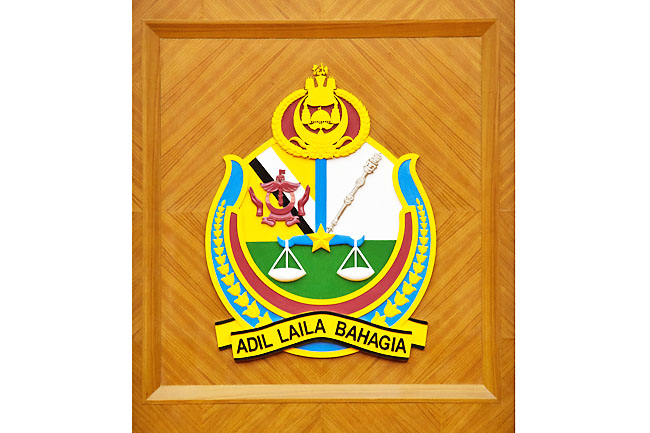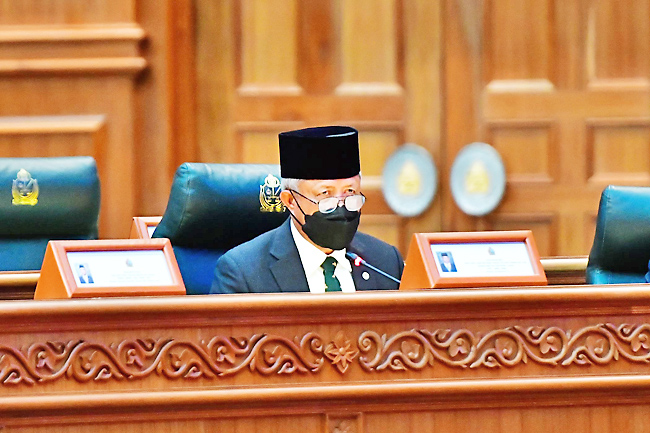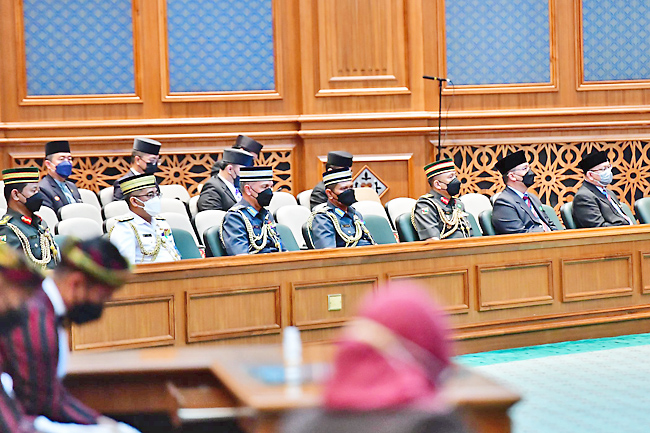Azlan Othman
The Ministry of Defence (MinDef) has been allocated a BND597,673,680 budget, Minister of Defence II Yang Berhormat Pehin Datu Lailaraja Major General (Rtd) Dato Paduka Seri Haji Awang Halbi bin Haji Mohd Yussof announced on the fourth day of the 18th Legislative Council (LegCo) session yesterday.
Until today, the threat dealt by the pandemic remains difficult to predict, particularly with regard to when it will end. This is assessed as a ‘manifestation of uncertainty’ often mentioned when discussing future security threats and risks, he said.
Based on such uncertainty, the MinDef and Royal Brunei Armed Forces (RBAF) remain aware of the importance of creating effective levels of capacity, capability and preparedness to enable adaptability and rapid response to threats that may arise, he said.
Strategic planning – and the implementation of capacity building, capability and preparedness in military medicine and military operations other than war (MOOTW) in particular – has increased the responsiveness level, and enabled MinDef and the RBAF to support national response in the face of the pandemic.
“Since the onset of the second COVID-19 wave in August 2021, the RBAF has been entrusted with greater responsibilities, through the leadership of the National Coordination Centre for COVID-19 (N3C19), in collaboration with the Ministry of Health (MoH),” Yang Berhormat Pehin Datu Lailaraja Major General (Rtd) Dato Paduka Seri Haji Awang Halbi said.
The centre serves as the main driving force in determining the administrative needs and in planning non-clinical operations with ministries, agencies and departments concerned.



“Although we are not at war with the enemy from a conventional point of view, the existing elements of operational planning based on military principles, concepts and doctrines such as command and control, as well as civil-military cooperation (CIMIC) are also assessed as relevant and used in coordinating more orderly and effective responses in this complex operation.
“Apart from N3C19, the COVID-19 Task Force was also established in 2020 to provide operational assistance in supporting the capacity of the MoH through the role of energy assistance and leadership at isolation centres, logistical assistance, laboratory testing and COVID-19 screening, implementation of vaccination programmes, mosque operations as well as funeral services assistance,” he said.
Yang Berhormat Pehin Datu Lailaraja Major General (Rtd) Dato Paduka Seri Haji Awang Halbi said through existing and newly established mechanisms, approximately 3,000 RBAF members have been deployed to 18 locations across the country to jointly curb the outbreak.
Additionally, over 100 officers and civil servants from MinDef are serving as frontliners and volunteers at N3C19, the MoH and the Medical Reception Centre (MRS), Bolkiah Garrison.
Although RBAF’s involvement during the pandemic crisis appears to be more towards non-traditional operations, its readiness to execute conventional operations and routine relief operations are not at all neglected, he said.
The protection of the Sultanate’s key infrastructures, security patrol operations at land borders and maritime areas (including mouse trail), airspace surveillance as well as humanitarian assistance and disaster relief (HADR) continue at all times.
Yang Berhormat Pehin Datu Lailaraja Major General (Rtd) Dato Paduka Seri Haji Awang Halbi said a security trend identified since the start of the pandemic (two years ago) is the increase in the number of cross-border criminal activities, including illegal drug smuggling.
“This is certainly a very worrying trend, but with cooperation from security and enforcement agencies, as well as the people of this country, Alhamdulillah we have managed to curb illegal activities by conducting more operations. The whole-of-nation approach practiced also involves the RBAF, which has expanded its operational footprint in areas of the country, in jointly advancing our collective agenda towards strengthening the government’s effectiveness in combatting cross-border crime.”
“Overall, the RBAF’s ability to make a significant contribution in the containment of emergencies or crises (such as COVID-19) is a dividend or return on the government’s large investment over the years when evaluated in terms of the effectiveness of military exercises, courses, and ongoing efforts in fostering civil-military cooperation since its 60-year inception,” he said.
“Meanwhile, in upholding His Majesty Sultan Haji Hassanal Bolkiah Mu’izzaddin Waddaulah ibni Al-Marhum Sultan Haji Omar ‘Ali Saifuddien Sa’adul Khairi Waddien, Sultan and Yang Di-Pertuan of Brunei Darussalam’s titah during the Sovereign’s Parade of the RBAF Officer Cadet School last month, the MinDef and RBAF will Insya Allah continue to confidently make a meaningful contribution in tackling the COVID-19 spread,” the minister said.
“Indeed, the titah of appreciation from the monarch has and continues to inspire MinDef and RBAF members to effectively execute their duties and responsibilities.”
As the mainstay in protecting and defending the territorial integrity and sovereignty of the country, it has proven important for MinDef, especially in such testing times, to exist as a strong and credible defence entity in terms of capacity, capability, spirit and commitment. This is what is revealed in the updated MinDef vision, which is to create “a respected armed forces and strong partners”, he said.
“Achieving this aspired defensive posture largely requires alignment with the security and geopolitical landscape around us. Dynamic strategic developments, both within and outside the region, are constantly bringing about changes to the spectrum of threats that in turn have implications on national defence.
“These include political instability, crises of economic fragility, resource over-demand, natural disasters, climate change, as well as terrorism and extremism. These developments are expected to continue to shape and influence our security environment over the next 15 years and past the year of Brunei Vision 2035, which will also largely depend on various driving factors such as globalisation, digitisation, automation and migration.
“Although such developments are also shrouded in uncertainty, what is becoming increasingly clear is that we need to create effective deterrence factors and the ability to respond quickly to a spectrum of threats and challenges from various directions, both traditional and non-traditional,” he said.
Yang Berhormat Pehin Datu Lailaraja Major General (Rtd) Dato Paduka Seri Haji Awang Halbi said against the backdrop of the determination and enthusiasm of people from MinDef and RBAF working together despite the pandemic, thorough and comprehensive assessments have been made, and from it, resulted in a more planned and directed defence development planning.
“This is manifested with the launch of the 2021 Defence White Paper – Defending the Nation’s Sovereignty: A Secure and Resilient Future by His Majesty in conjunction with the RBAF’s Diamond Jubilee on May 31, 2021,” he said.
This latest white paper outlines specific strategic challenges from the lens of Brunei Darussalam and further presents updated defence strategies and priorities from previous white papers following demands on an increasing and maturing defence role of the RBAF.
Also outlined are more comprehensive defence tasks based on current priorities that include monitoring the strategic environment to ensure early identification; defending the country from external threats; collaborating with stakeholder agencies in jointly protecting national interests in the country’s maritime and land border areas, as well as enhancing the country’s capacity to address terrorism and cyber threats; providing support to public agencies especially if the challenges faced are beyond scale and exceed the capabilities of public agencies; working closely with other countries through defence diplomacy, whether ASEAN countries or countries outside the region; and supporting broader regional and international efforts, which lead to regional stability in general and/or specifically to peacekeeping operations and humanitarian aid operations while gaining experience and increasing the knowledge of members.






